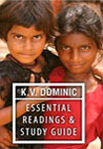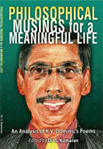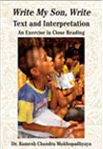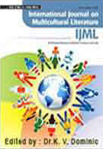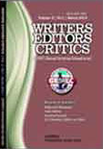Books Review in Detail
Review Of Prof. Kavitha Gopalakrishnan’s Article on Winged Reason
Prof. Kavitha Gopalakrishnan’s Article on Winged Reason
Reason, Realism, Sensibility and Sensitivity on the Wings of the Cuckoo: An Analysis of K. V. Dominic’s Winged Reason
Prof. Kavitha Gopalakrishnan
Assistant Professor of English, Viswajyoti College of Engineering and Technology, Vazhakulam, Muvattupuzha, Kerala, India
(Appeared in Critical Evaluation of Contemporary Indian Poetry in English, edited by K. V. Dominic and published by Access, New Delhi, 2012)
Today’s torturer
tomorrow’s victim;
we live with ironies. (“Old Age,” Winged Reason 52)
These lines showcase the basic characteristic feature, the underlying current, in the thirty- nine poems in the latest collection of Prof. K. V. Dominic’s Winged Reason. These lines come from a sensitive heart, a sensible, analytic brain that reasons out the contemporary world in a manner that is realistic and convincing.
Dedicated to Late Varghese Kannappilly, the poet’s father, this new collection of Prof. K. V. Dominic indicates how he pursues his craft seriously and showcases his poetical journey on the wings of the cuckoo–the wings of reason than imagination. This journey is earmarked with reason, realism, sensibility and sensitivity. The title of the collection is therefore a tell-tale title. Cuckoo is the bird the poet likes the most and in the Preface he says thus: “The poetic muse—let me call it cuckoo, the bird which I like most–started to sing in my mind” (Winged Reason 13).
He refers to his favourite bird in Poem 24 “Sleepless Nights.” He begins the poem by saying how the cuckoo’s melodious music wakes him up every dawn. Then goes on to say how he has sleepless nights of late, and compares it with the blissful sleep of the cuckoo. He longs to have a sound sleep on the “God-given bed”, “free from cares and worries.” In the final stanza he writes:
Ah, the cuckoo finally calls me out;
let me get up, get out of my cell,
and have a bath in the pool of morning beauty. (Winged Reason 56)
The word ‘Ah’, strikes a chord with in us—it is an exclamation of relief and joy. The poet probably means that the cuckoo has at last entreated him to come out of his mundane life, from routines and to think afresh, anew after submerging into the pool of poesy. In yet another poem “Cuckoo Singing,” the poet writes:
4.30 a.m.
Cuckoos’ songs echo:
waking call
for dreaming day. (Winged Reason 30)
The poet implicitly suggests that dwelling in the dreamland is only a temporary escape which on cuckoos’ call is shattered into bits. The cuckoos’ notes prompt man to wake up—both physically, emotionally and spiritually.
The poet does not wish to alight on the wings of the cuckoo and fly to the land of imagination. He wishes to address the issues plaguing our country and countrymen through his poetry, and send the right message across. His sense of language is competent enough for him not to be obtrusively bizarre. He has adopted “a conversational style in poetry, which again attracts the ordinary readers” (12). The simple, lucid language provides little cover for the subtle dig he takes at various situations:
Thus democracy reigns
drinking tears of thousands!
Criminal MPs,
brought from jails
to prove majority on floor
horse-trade of billions!
. . . . . . . . . . . . . . . . .
still democracy shall prevail
or tyranny will
sit on the chair. (“Indian Democracy,” Winged Reason 60)
The apparent simplicity of his language however conceals the depth of his thought.
International Women’s Day;
celebrations all over the world;
. . . . . . . . . . . . . . . .
her praises sung hoarse
course in her life’s course
mockery’s rhetoric in these celebrations! (“International Women’s Day,” Winged Reason 42)
or as in
connubial bliss,
heavenly happiness;
merging of two souls;
fulfilment of His plans. (“Connubial Bliss,” Winged Reason 29)
At places the lines become epigrammatic:
Put charity in humanity
a spiritual bliss that never dies. (“Lal Salam to Labour,” Winged Reason 45)
We see the terse, epigrammatic style in these lines too:
If heaven is happiness
and happiness heaven,
they are in
and we are out. (“Human Brain,” Winged Reason 59)
The simple language in the collection is sensitive and lively enough to allow the poet to come up time and again with delightfully surprising images:
An old lily flower
pale and faded.
Dawn to dusk
sitting in an armchair,
. . . . . . . . . . . . . . .
she remains lonely. (“Gayatri’s Solitude,” Winged Reason 31)
In the poem “What a Birth!” the poet has wonderfully weaved a series of images to bring forth the plight of women. In it each stanza is an image in itself and these harmoniously relate to one another, thereby effectively conveying the pitiable image of a labour class woman.
Dawn for doom
Dusk to damn
What a birth! (Winged Reason 58)
The poet’s imagery, as we see in this collection, is undecorative and functional. The startling images and the visual juxtapositions are the underlying strength of these poems. The poet cultivates a deliberately prosaic style and at their best they become memorable individual images themselves. We see this quality even in “Nature’s Bounties.”
The sun kisses
The eye opens
Lotus blooms
………………
Parched fields
Rain in summer
Honey to the lips (Winged Reason 49 -50)
His images, immediately strike a chord with the readers as they are living and captivating. He manages to do so because he mostly draws upon his experiences:
Pleasures come like sprinkles,
while pains fall like a deluge
and continue like monsoon. (“Pleasures and Pains,” Winged Reason 68)
One notable characteristic feature of his diction, phrases and imagery is that it is tempered equally with emotion and reason. The images of light and lamp are often repeated:
The analogy of the lamp and the pot
I lectured for the Rasa theory;
. . . . . . . . . . . . . . . . . . . . . .
searching for the lamp and its light.
. . . . . . . . . . . . . . . . . . . . . .
She is the light of the class,
light of the family,
light of the village,
but alas the light never sees itself
. . . . . . . . . . . . . . . . . . . . .
Light fighting against darkness, (“Helen and Her World,” Winged Reason 38-39)
We may see a reference to the lamp in “Laxmi’s Plea”:
“She is a lamp to any house.”
A lamp destined to burn out (Winged Reason 46)
One of the distinguishing features of Winged Reason is that it showcases the ‘bleeding heart’ of the poet on seeing the world today. In the Preface he mentions in detail how terrorist attacks, corruption, rich-poor divide are the thorns that ‘pierces’ his heart every day and how seeing this ‘gushing blood runs through his pen to paper’ (Winged Reason 13).
I wish I were a bullet
and shoot into the chest of that terrorist
who compels that teenage boy
to explode and kill that innocent mob. (“A Blissful Voyage,” Winged Reason 21)
These lines bare open the poet’s heart which bleed at sights of terrorist acts. His heart also aches when he sees corruption and the rich-poor divide that exists all around us:
When millions die of hunger,
thousands compete for delicacies.
Minority always luxuriates
at the cost of
majorities’ necessities. (“Haves and Have-nots,” Winged Reason 36)
We see the same sentiment in “Lal Salam to Labour”:
They sow the seed;
reap the corn;
and we eat and sleep.
They build houses
where they never rest,
and there we live and snore. (Winged Reason 44)
He openly voices against corruption:
Parliament elections:
several billion business;
stage of heinous means. (“Indian democracy,” Winged Reason 60)
He also brings to light how all these atrocities are performed under the guise of service to God.
Secularism butchered;
caste and religion
raise their hood;
. . . . . . . . . . . . . .
National parties play
trump card with communalism; (“Indian democracy,” Winged Reason 60)
Yet another poem “In the name of God” highlights this point:
Corruption is promoted
in the name of God.
God is dethroned
in the name of God. (Winged Reason 70)
The poet thus is undoubtedly concerned with the cares of the world, but this does not mean that he has severed his association with his native place and surroundings. He rather frequently resorts to native themes, traditions, sensibility and bindings. This is clear in his poem “Onam.” In it he relates the festival Onam, recounts its legend and brings to light the essence of the festival, the thought behind it, and finally strikes a chord when he shows how the ostensible affluence fails to impress Maveli:
But granted him a boon
to visit his people
once in a year.
Maveli visits on Onam;
Fed up he
he returns in tears. (Winged Reason 54)
‘He’ is repeated twice–in the second last and last line. This sends across the feeling that probably the poet is in tears and is sobbing along with Maveli.
The poet is equally moved at the plight of animals and plants. We are moved to tears when we read “I am Just a Mango Tree.” We wonder how man can act so mercilessly:
“Dear, why should they cut this tree,
a cool shelter to countless?”
“They plan to build a waiting shed here.”
. . . . . . . . . . . . . . . . . . .
Can’t they spare me and
build it some were else? (Winged Reason 41)
We are filled with similar emotion when we read “A Sheep’s Wail”:
The milk for my lamp
you suck and drain
and grow fat and cruel
. . . . . . . . . . . . . . . . . .
Man, you are the cruelest,
you are the most ungrateful
of all God’s creations. (Winged Reason 24-25)
He is able to read the mind of these speechless beings and pens down their heart-rending cries. He seems to be in total communion with them when he writes:
If a heaven is there
we will reach there first
and pray to God to shut you out. (“A Sheep’s Wail,” Winged Reason 25)
Or when the Mango tree sighs:
God why is your Man so selfish and cruel?
Did you create him,
to disturb this earths balance?
This planet would be a paradise
if you kindly withdraw him. (“I am just a Mango Tree,” Winged Reason 41)
The poet then further relates how he was blessed with an all-encompassing compassion for other beings:
Once when I pulled a fish,
Flashed a horrible vision:
I am pulled from the sky;
death struggle on the line.
Awestruck and repentant,
I unhooked the fish
and dropped in the water. (“My Teenage Hobby,” Winged Reason 48)
And he shows how he means letter and spirit of what he says:
lived non-veg life;
believed in the teachings
that man is the centre of universe
. . . . . . . . . . . . . . . . . .
my eyes are opened at last
and I have become
a pure vegetarian. (“How I Became a Vegetarian,” Winged Reason 76)
The poet also shows how this cruelty is latent in mankind. Man does not spare young kids and even one’s own family members. In “City Versus Village” the poet delineates people’s mindset:
Busy and selfish,
devoid of humanity
Each one lost
in his own island. (Winged Reason 71)
In “Anand’s Lot,” the poet further describes the extent of man’s cruelty. Young kids are not spared; they are kidnapped and made to beg on the roads:
Alas! Like a vulture came the car then;
picked me in and dashed away.
. . . . . . . . . . . . . . . . . . . . . . .
The bearded-man slapped helpless Anand
“Go to the shops and beg or I’ll kill you.” (Winged Reason 26-27)
He also showcases the vices of drinking alcohol. The men after having liquor beat up their family members and create unrest in the family. The poet describes the dark side of such families in a heart-rending manner. “Rahul’s World” is one such example:
Drunken father
beat mother,
beat Rahul;
kicked away supper,
none could sleep. (Winged Reason 55)
In “What a Birth” too poet conveys this idea:
Drunkard husband
will come at night
to resume beats and kicks. (Winged Reason 58)
The poet deals with other ills of society too. In “Laxmi’s Plea” he wonderfully draws the portrait of a girl who is badly affected by the system of dowry:
Plenty of proposals;
. . . . . . . . . . . . . . . . .
None complained my looks.
“What’s the dowry?”
A stumbling block to all proposals. (Winged Reason 46)
We feel terribly sorry when she states towards the end, “Leave me alone; / leave me single” (Winged Reason 47). Laxmi feels that she needs to be somewhere alone, so as to avoid facing people and their questions.
Solitude is a state which often surfaces in this collection. Poet seems to be conveying the idea that solitude is a fact of life and we may have to encounter it at one point or the other. In “Gayatri’s Solitude” the poet describes the lonely life of Gayatri, a widow aged eighty-two, whose children are abroad:
Dawn to dusk,
. . . . . . . . . . . . . .
looking at the far West,
longing for her children’s calls,
she remains lonely. (Winged Reason 31)
In a heart rendering description of Tsunami Camps the poet describes how these people are left to suffer all by themselves:
“We don’t get help
either from the Right or from the Left.”
Unending wails and unending sobs:
not even Gods listen to their cries. (Winged Reason 34)
In “Old Age” he describes the pain of having a solitary existence, with none to care:
The dearest children,
to whom he looked and loved
turn ungrateful.
They hate and curse.
And never care. (Winged Reason 52)
In poems like “Vrinda” and “Cry of My Child,” the poet draws portrayals which seem to showcase how people inch forward despite physical handicaps and troubles.
God, only one leg!
Skipping like a kangaroo
. . . . . . . . . . . . . . . . .
- HOME
- BIOGRAPHY
- AWARDS
- INTERVIEWS
- BOOKS
- JOURNALS
- POEM-AUDIO
- CRITICAL ARTICLES
- CRITICAL BOOKS ON K V DOMINIC POETRY
- BOOK REVIEWS
- GIEWEC
- Overview
- Bylaws
- Patron Members
- EVENTS
- ANNOUNCEMENTS
- GALLERY
- CONTACT

